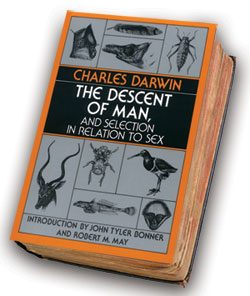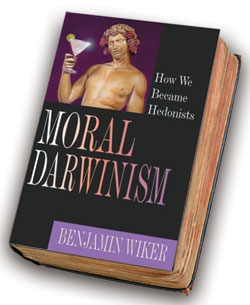Social Darwinism
Racial inequality, and ethnic discrimination, unfair competition, the oppression of the poor, the exploitation of the weak by the strong, and the idea that might is right, are evils that societies have experienced throughout history. Thousands of years ago, for example, at the time of Prophet Moses (pbuh), Pharaoh regarded himself as superior to everyone else on account of his wealth and powerful army. He rejected Prophets Moses and Aaron (peace be upon them) and even sought to kill them, though they were clearly speaking the truth. Pharaoh also implemented discriminatory policies, divided his people into classes, describing some as “inferior,” inflicted numerous tortures on the Israelites under his rule, killed their men aiming to bring their race to extinction. The Qur'an describes Pharaoh's perversions:
Pharaoh exalted himself arrogantly in the land and divided its people into camps, oppressing one group of them by slaughtering their sons and letting their women live. He was one of the corrupters. (Surat al-Qasas, 4)
“Am not I better than this man who is contemptible and can scarcely make anything clear?” (Surat az-Zukhruf, 52)
In that way he [Pharaoh] swayed his people and they succumbed to him... (Surat az- Zukhruf, 54)
And We bequeathed to the people who had been oppressed the easternmost part of the land We had blessed, and its westernmost part as well…(Surat al-A'raf, 137)
Ancient Egypt was by no means the only extremist society where only might was regarded as right, humans were divided into classes, those regarded as “inferior” were oppressed and subjected to inhuman treatment. There are numerous examples of other such regimes, right up to the present day.
In the 19th century, however, these evil practices acquired a whole new dimension. Up until then, measures and policies that had been regarded as cruel, suddenly began to be defended with the falsehood that they were “scientific practices based on facts of nature.” What was it that suddenly justified all these forms of ruthlessness?
 |
| Darwin's erroneous statement that the weak and powerless need to be oppressed, backed up by his unscientific theory, is one of the main factors behind the spread of inequality and injustice. |
Charles Darwin's theory of evolution was put forward in his book The Origin of Species. Published in 1859, it contained a number of conjectures about the origin of life that led to a most deceptive world view, devoid of any scientific evidence, and a perverted philosophy that denies the existence of God and regards “chance” as a creative force (surely God is beyond that). Views that man was a kind of animal, and life was a sphere of struggle and fierce competition were accepted as scientific truth.
Darwin did not develop this theory, which was advanced as a result of the 19th century's primitive understanding of science, on his own. Some 50 years earlier, in 1798, Thomas Malthus proposed a number of ideas that had nothing to do with reality, in his book Essay on the Principle of Population. This study—which has now been proven to have no scientific value at all—claimed that population increased far more quickly than food resources, and that therefore, population increase needed to be controlled. Malthus suggested that wars and epidemics acted as “natural” checks on population, and were thus beneficial. He was the first to refer to the “struggle for survival.” According to his thesis, far removed from humane values, the poor must not be protected but allowed to live under the worst possible conditions and prevented from multiplying, and sufficient food resources must be reserved for the upper classes. (For details, see Chapter 2, “The History of Ruthlessness, from Malthus to Darwin.”) This cruel savagery would certainly be opposed by anyone with a conscience and common sense. Although religious moral values require extending a helping hand to the poor and needy, Malthus—and his follower Darwin—said that these people should be ruthlessly left to die.
The British sociologist and philosopher Herbert Spencer headed the list of those who immediately adopted and developed these inhumane ideas. The term “the survival of the fittest,” which sums up Darwinism's basic claim, actually belongs to Spencer. He also claimed that the “unfit” should be eliminated, writing that: “If they are sufficiently complete to live, they do live, and it is well they should live. If they are not sufficiently complete to live, they die, and it is best they should die.”1 In Spencer's view, the poor, uneducated, sick, crippled and unsuccessful should all die, and he sought to prevent the state from passing laws to protect the poor.
Spencer possessed a great lack of compassion for people who should awaken feelings of compassion and protection and, just like Malthus, he sought for ways to get rid of them. In Darwinism in American Thought, the Ame
Rican historian Richard Hofstadter makes the following comment:
Spencer deplored not only poor laws, but also state-supported education, sanitary supervision other than the suppression of nuisances, regulation of housing conditions, and even state protection of the ignorant from medical quacks.2
Darwin, powerfully influenced by Malthus and Spencer's ruthless world views, proposed in The Origin of Species the myth that species had evolved by means of natural selection. Darwin was no scientist, and took only an amateur's interest in biology. Under the very primitive microscopes of Darwin's time, cells appeared to be nothing more than blurry blots, and the biological laws of inheritance had not yet been discovered. Darwin's theory, developed with very limited scientific knowledge and under inadequate scientific conditions, claimed that nature always “selected” the fittest with the most advantages, and that life developed accordingly. According to this theory, built on totally erroneous foundations right from the outset, life was the work of chance; Darwin thus rejected the fact that life was created by God (Surely God is beyond that!). After The Origin of Species, Darwin set about adapting his unscientific theory to human beings in The Descent of Man. In that book, he referred to how the so-called backward races would be eliminated in the near future, and that the more advanced ones would develop and succeed. Darwin's adapting his theory of evolution to human beings, in this book and certain other of his writings, shaped Social Darwinism.
His determined followers then carried matters forward. The most prominent proponents and practitioners of Social Darwinism's were Herbert Spencer and Darwin's cousin Francis Galton in Britain, certain academics like William Graham Sumner in America, and Darwinists such as Ernst Haeckel, and later fascist racists like Adolf Hitler in Germany.
Social Darwinism quickly became a means whereby racists, imperialists, proponents of unfair competition under the banner of capitalism, and administrators who failed to fulfill their responsibility to protect the poor and needy attempted to defend themselves. Social Darwinists sought to portray as a natural law the oppression of the weak, the poor and so-called “inferior” races, as well as the elimination of the handicapped by the healthy, and small businesses by large companies, suggesting that this was the only way humanity could progress. They sought to justify all the injustices perpetrated throughout history under a scientific rationale. Social Darwinism's lack of conscience and compassion was depicted as a law of nature and the most important road to so-called evolution.
In particular, various American capitalists justified the climate of unrestrained competition they established, according to their own lights, with quotations from Darwin. In fact, however, this was nothing less than a huge deception. Those who attempted to give ruthless competition a so-called scientific basis were merely lying. For instance, Andrew Carnegie, one of the greatest capitalists and one of those caught up in that falsehood, said the following in a speech he gave in 1889:
The price which society pays for the law of competition, like the price it pays for cheap comforts and luxuries, is also great; but the advantages of this law are also greater still than its cost — for it is to this law that we owe our wonderful material development, which brings improved conditions in its train. ... While the law may be sometimes hard for the individual, it is best for the race, because it insures the survival of the fittest in every department. We accept and welcome, therefore, as conditions to which we must accommodate ourselves, great inequality of environment; the concentration of business, industrial and commercial, in the hands of a few; and the law of competition between these, as being not only beneficial, but essential to the future progress of the race.3
According to Social Darwinism the sole objective of a race is its physical, economic and political development. Individuals' happiness, well-being, peace and security appear unimportant. No compassion at all is felt for those who suffer and cry out for help, for those unable to provide their children, families and aged parents food, medicine or shelter, or for the poor and powerless. According to this twisted concept, someone poor but morally upright is regarded as worthless, and that person's death will actually benefit society. In addition, someone rich but morally corrupt is regarded as “most important” for the “progress of the race” and, no matter what the conditions, that individual is seen as very valuable. This twisted logic propels Social Darwinism's proponents towards moral and spiritual collapse. In 1879, another Social Darwinist, William Graham Sumner, expressed this perverted trend's deceptions:
... we cannot go outside of this alternative: liberty, inequality, survival of the fittest; non-liberty, equality, survival of the unfittest. The former carries society forward and favors all its best members; the latter carries society downwards and favors all its worst members.4
The most savage adherents of Social Darwinism were racists, the most dangerous, of course, being the Nazi ideologists and their leader, Adolf Hitler. The heaviest cost of Social Darwinism came at the hands of the Nazis, who implemented eugenics, the claim put forward by Darwin's cousin, Francis Galton, to the effect that communities can consist of higher-quality individuals by the elimination of poor genes. They also engaged in genocide using Darwinist statements as a screen, as if these in some way justified their actions. At the advice of Darwinist scientists they exterminated Jews, Gypsies and East Europeans, whom they regarded as inferior races. They slaughtered the mentally ill, the handicapped, and the elderly in gas chambers. In the 20th century, millions were killed by the most ruthless methods in the name of Social Darwinism before the eyes of the world.
The eugenics movement, led by Francis Galton, emerged as another disastrous product of Social Darwinism. Its supporters maintained that human selection was needed to accelerate natural selection, believing that human development itself could thus be speeded up. They inflicted compulsory sterilization on “unnecessary” people in a great many countries, from America to Sweden. Regarded as less than human, hundreds of thousands were operated on against their will, without their families' knowledge or permission. The cruelest implementation of eugenics occurred in Germany, where the Nazis first sterilized the crippled, mentally defective or those with inherited diseases. Unsatisfied, they then began slaughtering these people en masse. Hundreds of thousands were put to death, just for being old or lacking fingers or limbs.
 |
| The Nazis first sterilized children with mental or inherited illnesses, and then began sending them to gas chambers. Even children lacking just a thumb became the targets of eugenicist killing. |
Such cruel savagery has absolutely no place in religious morality. God has commanded people to protect and nurture the needy. Meeting the needs of the poor, treating the handicapped with affection and compassion and observing their rights, and ensuring cooperation and solidarity in society are all required by religious ethics. Those who ignore the moral values commanded by God, however, propel towards catastrophe both themselves and the societies they live in.
Another catastrophe for which Social Darwinism provided alleged justification is colonialism. A number of administrators of colonial states tried to justify their ruthless exploitation of native populations with Darwinist theses lacking any scientific validity or logical consistency. They claimed that “inferior races” needed to be kept under the control of “superior races” because this was a law of nature, and founded their policies on this so-called scientific basis.
By using the twisted logic of Social Darwinism, combatants in the 20th century's two world wars sought to depict war as inevitable. They attempted to depict the killing of the innocent and the poor; the destruction of their homes, businesses, and livestock; the forcing of millions from their homes and lands; and the uncaring slaughter of babies and children as ways of ensuring human progress.
In conclusion, Social Darwinism was the motive force that cost the lives of millions in the 19th and 20th centuries. With it, many evils that had persisted for centuries acquired an alleged scientific justification. In his book The Mismeasure of Man, the late evolutionist paleontologist Stephen Jay Gould reveals this yet again in commenting on Darwin's Origin of Species:
Subsequent arguments for slavery, colonialism, racial differences, class structures, and sex roles would go forth primarily under the banner of science.5
Darwin Himself Was a Social Darwinist
 |
| Darwin's book The Descent of Man |
No matter how much today's evolutionists try to separate Darwin's name from the sufferings that Social Darwinism gave birth to, Darwin used unambiguous Social Darwinist expressions, especially in his Descent of Man and other writings. As far back as 1869, in a letter to Hugo Thiel he stated that he saw no objection to his theory being applied to society:
You will really believe how much interested I am in observing that you apply to moral and social questions analogous views to those which I have used in regard to the modification of species.6
Benjamin Wiker is a lecturer in theology and science at Franciscan University and author of Moral Darwinism: How We Became Hedonists. In an interview, he stated that Darwin was the first Social Darwinist, and continued:
 |
| Benjamin Wiker's book Moral Darwinism |
Like it or not, it is quite clear when you read his Descent of Man that Darwin himself was the first Social Darwinist and the father of the modern eugenics movement. Social Darwinism and eugenics are derived directly from his principle of natural selection.
I think the real reason for people objecting to someone making connections between Darwinism and things like eugenics is that they don't want the theory to be tarnished by its moral implications. But the implications are there, not only in the text, but as evidenced in the social and moral effects Darwinism has had in the century and a half since it appeared.7
As you'll see in the following chapters, many of Darwin's expressions and statements clearly reveal him to have been the original source of Social Darwinism. Modern evolutionists hesitate to accept these views on account of Social Darwinism's terrifying results in the 20th century. Yet competition, racism, and discrimination—fundamental elements of Social Darwinism—also lie at the basis of the theory of evolution. Whether or not evolutionists accept the fact, these are the consequences of adopting Darwinism. Any theory that views human beings as the product of chance, as a slightly more advanced form of animal; that claims that some races are less developed than others and are therefore closer to animals; and that humanity can progress by means of the strong oppressing the weak, will inevitably have tragic consequences. Evolutionists' apparent rejection of Social Darwinism is no solution. Our hope is that those whom has the theory deceived will finally come to accept that the theory of evolution is scientifically bankrupt.
 |
| The perception of war as necessary for the advancement of races or nations is one result of Darwinist philosophy that wreaked such destruction. French streets shattered during World War II, one of the bloodiest wars ever, are proof of this. |
The Error of Applying Nature's Laws to Human Beings
 |
| If a society's needy are mistreated and abandoned to their own devices, this leads to tension and anger, unless patience and forgiveness prevail, encouraged by religious moral values. |
At the time when Darwin proposed his theory, science was still rather backward in many respects. The electron microscope had not yet been invented, for which reason the minute details of living organisms were unseen. The cell still resembled a simple blot, and no one knew that it possessed a structure no less complex than that of a city, made up of a great many different organelles. There was no science of genetics; the biological laws of inheritance remained to be discovered. Many biologists and scientists, including Darwin himself, were sufficiently ignorant as to believe that “acquired” characteristics could be passed on to subsequent generations. For example, they believed that if a blacksmith developed powerful muscles because of his work, his sons would have equally strong muscles. In that primitive scientific climate, Darwin developed his theory. Neither Darwin nor any who supported him was able to submit evidence for the theory of evolution from such branches of science as paleontology, biology or anatomy. Moreover, observations and experiments performed in the following years, and especially new findings obtained in the 20th century, revealed that the theory was clearly wrong. But despite the theory's scientific weakness, its providing a basis for materialist and atheist thought led to its immediate adoption by one part of the scientific world.
Certain circles began to apply the theory of evolution to the social sphere, on account of the ideological messages it contained. It took its place at the root of such 20th-century disasters as genocide, mass slaughter, civil wars in which brother slew brother, and world wars that ruined nations. Religious moral values and the virtues they bring with them, were abandoned in favor of the law of the jungle in which the weaker are oppressed and eliminated. This theory, devoid of any scientific validity, influenced an entire century.
 | |
| The primitive microscopes of Darwin's time gave the impression that the cell was merely a simple structure of undifferentiated protoplasm. | On the other hand, modernday microscopes have shown how complex and flawless the structure of the cell truly is. |
One of Social Darwinists' major errors was their attempt to implement that theory to the social arena. Another of their errors was to assume that laws applying to animals also applied to human beings whom God has created with conscience, reason, consciousness and the ability to make judgments. Therefore, contrary to what Social Darwinists claim, the laws of the jungle do not apply to human beings, every one of whom is responsible for using his abilities as best as he can throughout his life. God has also created human beings with a finite life span. When it comes to an end, all individuals will die, and will then be resurrected to account for all their behavior during their life of this world.
 |
| Social Darwinist practices inflicted on humanity only hatred and anger, conflict, murder and war. |
In nature, living things may die or become extinct when they cannot adapt to the prevailing conditions. For example, a dark-haired rabbit in a snow-covered forest may soon fall prey to a fox who can see it clearly. Yet, contrary to what Darwinists would have us believe, dead dark-haired rabbits don't give rise to the emergence of a new lighter-haired species. Furthermore, animals are very different from human beings, who do not have to adapt to natural conditions in order to live. We possess the means to change our surroundings in accordance with our needs and wishes. For instance, we adapt our buildings, heating and cooling systems and clothing according to the climate where we live. There is no natural selection in human societies, because human beings' reason and abilities prevent such elimination.
Such errors lead Social Darwinists to look at societies from an inhuman perspective. An important example of that perspective, so devoid of reason and conscience, is how they thought that societies could progress by abandoning the weak and needy, the powerless and handicapped to their own devices. The fact is that such a selfish refusal brings with it decline, not progress. Those whom Darwinism maintains should be neglected and left uncared for are conscious human beings, able to think and reason. When abandoned to injustice and cruelty, unless they possess the virtues of patience, forgiveness and understanding imparted by religious moral values, they may feel great anger and hatred for those who inflict such treatment on them. To assuage that anger, as many recent examples have shown, they may then resort to violence, which can then give rise to conflict and chaos. As a result of all the material and spiritual means expended to resolve those conflicts, there will be a decline in all spheres—from art to technology, from the economy to science—rather than progress.
 |
| If the suffering of the last century is not to be repeated, and if this 21st century is to be one of peace, then people need to be made aware of Darwinism's deceptions and dangers. |
Furthermore, killing the sick or handicapped in the name of eugenics, is not only terribly brutal, but also contributes nothing whatsoever to social progress. Such an open acceptance of murder will bring enormous losses that will spell ruin for society. Today, some 6% of the world's population—some half a billion people, a very large number—are handicapped. That would mean that everyone would lose someone from his family or circle of acquaintances, and will have acquiesced in their deaths. This will open spiritual wounds that wreak great harm on people's psychological well-being. In any society where a mother cannot trust her children, children their mother, or brothers each other, where one can allow another to be killed at any time, there will be severe degeneration and depression. In any case, a society that kills people just because they are handicapped is undergoing a devastating moral collapse. It must already have lost all spiritual values, all humanity. Without doubt, to claim progress by means of murder indicates very serious mental and psychological problems.
The greatest suffering will be experienced by those condemned to “elimination,” and that suffering will give rise to deep wounds in the consciences of others.
As the following pages will show, Social Darwinism sought, to apply to societies the theory of evolution—itself based on Charles Darwin's rather backward scientific understanding—but its world view is in total conflict with human nature. When put into practice, it belittles humanity and drags it back towards depression and chaos, bringing hatred that leads to conflict, warfare, and murder. Social Darwinism reached its peak during the second half of the 19th century and the first half of the 20th, but its adverse effects can still be seen in the present day. Under such names as “evolutionary psychology” and “genetic determinism,” attempts are still being made to evaluate societies according to the errors of Darwinism. In order to protect the 21st century from further catastrophes, the dangers of Social Darwinism must be revealed in all their aspects, and the world must be told that there is no scientific evidence for the theory on which this philosophy is based.
Footnotes
1. Herbert Spencer, Social Status, 1850, pp. 414-415.
2. Richard Hofstadter, Social Darwinism in American Thought, Rev. Ed., Boston: Beacon Press, 1955, p. 41.
3. Mark Kingwell, "Competitive States of America, Microsoft proves it: we're still wrestling with that treasured national ideal," New York Times, June 25, 2000; http://www.spaceshipearth.org/Letters/Editor/Competitive_States_of_America.htm
4. "Modern History Sourcebook: William Graham Sumner (1840-1910): "The Challenge of Facts;" http://www.fordham.edu/halsall/mod/1914sumner.html
5. Stephen Jay Gould, The Mismeasure of Man, New York: W.W. Norton and Company, 1981, p. 72.
6. Francis Darwin, The life and Letters of Charles Darwin, D. Appleton and Co., 1896, vol. 2, p. 294.
7. "Darwin as Epicurean: An Interview with Benjamin Wiker," http://www.touchstonemag.com/docs/issues/15.8docs/15-8pg43.html
- Introduction
- Social Darwinism
- The History of Ruthlessness, from Malthus to Darwin
- The “Robber Barons,” Darwin’s Followers
- Social Darwinism and the Favored Races Myth
- The Result of the Darwin-Hitler Coalition 40 Million Dead
- Social Darwinists' Sterilization and Death Laws
- A Theory That Belittles Women
- Darwinism and Moral Collapse
- The “Evolutionary Psychology” Error
- Conclusion
- The Deception of Evolution
